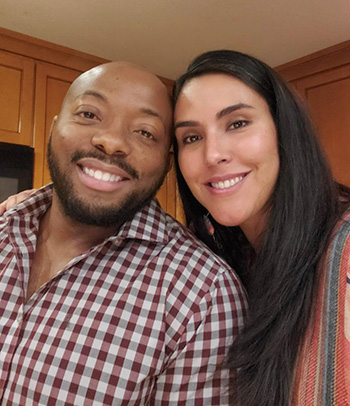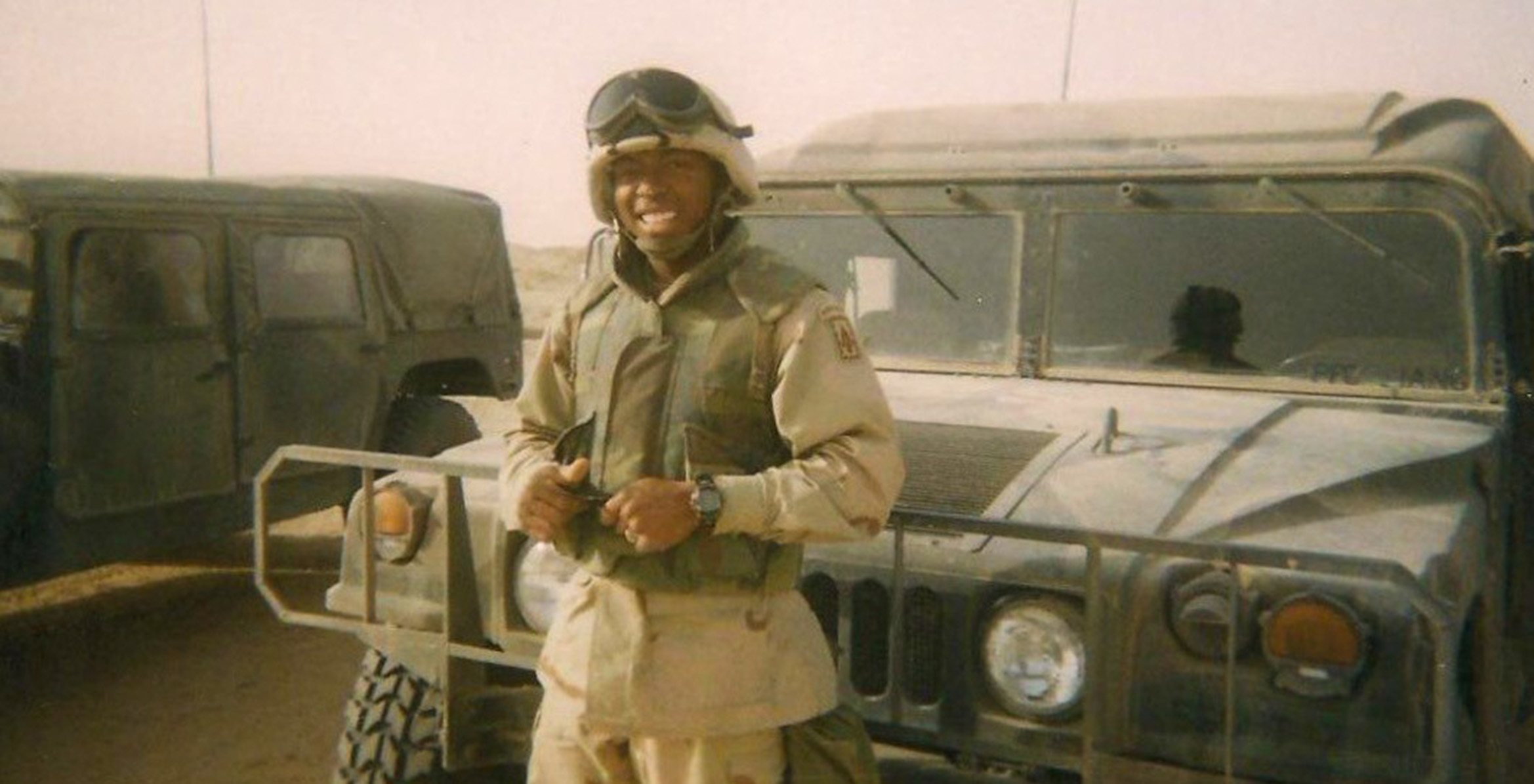The path to mental and emotional health is not always a straight one. Getting healthy can be full of highs and lows, starts and stops. Donny Moncrief, a Behavioral Health Service Manager at TriWest Healthcare Alliance (TriWest), knows this journey well. His story is one that represents the difficulty of acknowledging your mental health condition and the pain it can cause, but also of the benefits of working through and overcoming those challenges. With 20% of Americans affected by mental health conditions and even higher rates of mental illness among minority communities, shining a light on the journey to health and wellness with stories like Donny’s is more important than ever.
 Donny grew up in Mississippi and is a self-described “proud country boy who loves life.” He is a hard worker, a proud son, father and husband. Despite the success he’s had in his life, he considers himself “a work in progress” and is very aware of the importance of sharing one’s failures right alongside one’s successes.
Donny grew up in Mississippi and is a self-described “proud country boy who loves life.” He is a hard worker, a proud son, father and husband. Despite the success he’s had in his life, he considers himself “a work in progress” and is very aware of the importance of sharing one’s failures right alongside one’s successes.
Growing up, Donny’s parents placed a lot of emphasis on education. “Neither one of my parents achieved higher than a middle school education.” With his parents teaching him to “mind his books” and make something out of himself, Donny graduated high school and immediately pursued higher education. Since his family could not afford the cost of college, Donny entered the military to earn money under the Montgomery GI Bill.
Donny served in the Army for four years achieving the rank of Sergeant and was no stranger to combat. Donny participated in Operation Iraqi Freedom and Operation Enduring Freedom as part of the initial ground invasion into Iraq after Sept. 11, 2001. During his time in the Army, Donny learned the importance of values such as duty, honor and selfless service. “Engrained within my core are discipline, perseverance, self-improvement and more.”
Despite the numerous successes, leadership opportunities and valuable lessons Donny learned during his time in the Army, when he separated, he noticed that his mental health was suffering. But like so many others, Donny thought he could handle his struggles on his own. “When I was in the military ‘suck it up and drive on’ was the common phrase.” This mantra seemed to align with how he was raised as well. “When I was born and raised, the culture was ‘never let a hard time humble you.’ I knew how to embrace struggle.”
“Do not feel guilty about asking for help. Instead, feel empowered by it.”
But despite his attempts to deal with what was going on inside of him, Donny realized this was something different. “Try as I might, I simply was not equipped to combat such a powerful force.” The pressure to handle things, to deal with the tough times weighed a ton. “I wore a mask most of the time. On the outside, I was very nice and approachable.” But with those he was closest to, it was a different scenario. “I put up a concertina wire (barbed wire), around my heart as well as my feelings.” By isolating himself and pushing others away, Donny’s life began to suffer. He experienced divorce, debt, repossession, alcohol use and more. “Words and concepts such as mental health, PTSD, and what now may be considered common language, didn’t exist until I was out of the military.”
 At first, Donny had a hard time accepting professional help, so he turned to something else; Donny found relief in exercise. “My treatment has been and always will be a barbell.” However, about ten years after he left the military, he also discovered through talking to a trusted professional, that talking about his feelings to someone he trusted was a vital part of his recovery as well. “Rather than keeping that concertina wire up, I began to remove it. My treatment, outside the barbell, included me opening up my heart.”
At first, Donny had a hard time accepting professional help, so he turned to something else; Donny found relief in exercise. “My treatment has been and always will be a barbell.” However, about ten years after he left the military, he also discovered through talking to a trusted professional, that talking about his feelings to someone he trusted was a vital part of his recovery as well. “Rather than keeping that concertina wire up, I began to remove it. My treatment, outside the barbell, included me opening up my heart.”
Donny still believes there is strength in the struggle. He still believes we have to accept personal responsibility for our actions. He still believes his struggles helped to shape him. But he also knows there is strength in seeking help too. Looking back, Donny says “I do wish that I would have searched for and secured professional support. Simply for the selfless act of caring for my friends and family.” Luckily for Donny, his family and friends recognized his struggle and embraced him with unconditional love, a good reminder of the importance of letting people in. “Shout out to my wife! Talk about a warrior through and through. She saw something in me that I did not see in myself and she was willing to keep searching until she found it.”
 Donny now knows that good health requires a proactive approach. “Personally, I feel there is strength in the struggle, but you have to know when it is beneficial and when it isn’t. Support from an extended network, fitness and love helped me overcome my struggles. I am cut from the cloth of strong, unrelenting people. But now, that cloth has been made stronger with support from friends, family and loved ones…making it so strong, it cannot be cut.”
Donny now knows that good health requires a proactive approach. “Personally, I feel there is strength in the struggle, but you have to know when it is beneficial and when it isn’t. Support from an extended network, fitness and love helped me overcome my struggles. I am cut from the cloth of strong, unrelenting people. But now, that cloth has been made stronger with support from friends, family and loved ones…making it so strong, it cannot be cut.”
When asked to consider advice for others who may be experiencing mental health struggles, Donny shared this: “Be active mentally and physically. Seek mentorship. The VA, VSOs and other organizations have done so much to ensure that we are ‘full battle rattle’ for life. Take advantage of those resources. You earned it. Do not feel guilty about asking for help. Instead, feel empowered by it.”
Donny now uses his experiences to help others. “As a Behavioral Health Service Manager, I live and breathe the TriWest motto ‘Veterans serving Veterans.’ In the military, we are taught to lead by example and my work at TriWest epitomizes that. It requires hard work, dedication, perseverance and empathy.”
Donny’s story highlights that there are many different roads a journey to mental health can take. Exercise, physical health, support from a network of friends and family, a trusted resource to talk to—all of these outlets can help you begin your journey to wellness. If you are experiencing issues related to your mental health, check out the resources below. Your journey deserves a happy ending too.
Resources
- The Veterans Crisis Line offers confidential support for Veterans and their loved ones, regardless of whether you are enrolled in Department of Veterans Affairs (VA) health care.
- Make the Connection offers several stories, like Donny’s, of minority Veterans sharing their struggles with mental health and what steps they took to overcome them. Check out Nicole’s story, Chris’s story and more.
- The Office of Minority Health has several resources related to minority mental health, including population profiles that break down health data and disparities.
- NAMI devotes an entire section of its site to Veterans and active duty Service members that addresses many specific concerns including career worry, stigma and much more.
- VA offers many mental health resources for Veterans, including information about specific mental health conditions such as PTSD and depression, as well as available treatment options.







